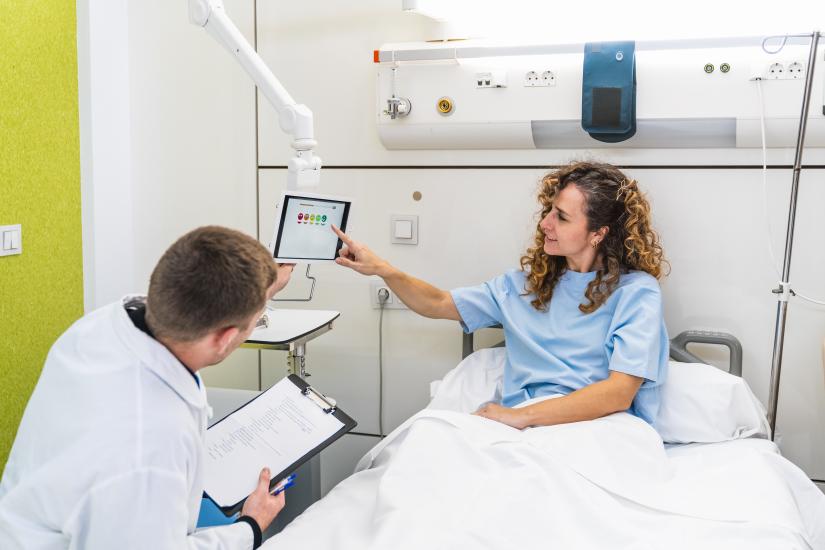UTS speech pathologist Dr Amy Freeman-Sanderson has been awarded over $670,000 for her project to optimise communication for critically ill patients.

Annually, over 175,000 people are admitted to Australian intensive care units (ICU), with over one-third of these patients unable to effectively communicate. Although communication impairment imposes a significant burden and cost on the health service, there is a lack of communication interventions that address and consider the patient journey across the arc of critical illness, including the pre and post ICU period.
“Effective communication is vital for patients to participate in their care, express needs, and engage socially,” explains Dr Amy Freeman-Sanderson, a seasoned speech pathologist and senior lecturer in the UTS Graduate School of Health (GSH).
“But when patients are critically unwell, their communication can be severely impacted. This could be due to physical changes, such as brain or nerve damage, muscle weakness, or the need for artificial airways, which often result in a temporary loss of voice,” continues Dr Freeman-Sanderson, who has just been awarded a significant grant to explore this issue.
The research project, funded by a five-year, $674,400 Investigator Grant from the National Health and Medical Research Council (NHMRC), aims to develop and test interventions that can enhance communication for ICU patients.
Collaboration, co-design and testing
The project is structured into three streams. The first involves working with patients, families, and clinicians to identify and prioritise research uncertainties related to communication during critical illness.
The second focuses on co-designing and developing communication interventions and care models that can be implemented before, during and after ICU admission. Dr Freeman-Sanderson notes, "We’re looking at both technological and non-technological solutions that can work across different stages of critical illness. For instance, we are seeking to optimise education and communication support for patients that are planned to receive an artificial airway. This might include optimising vocal options but also supplementing these with non-vocal methods like picture boards or gestures."
The third stream involves testing these interventions in a select number of ICUs to evaluate their feasibility and effectiveness. "The goal is to create sustainable, integrated communication pathways that can be adopted nationally and internationally," she continues.
Dr Freeman-Sanderson underscores the profound impact of impaired communication on patients and their families. “Patients often experience frustration, anxiety, and depression when they can’t express their needs or understand what’s happening. This can lead to emotional withdrawal and disempowerment, impacting their overall recovery,” she explains.
The research also highlights the importance of supporting healthcare staff. "If you’re continually saying, 'I don’t know what you’re saying,' and staff aren’t equipped with the right resources to enable and optimise communication, it can be very distressing for both patients and staff," Dr Freeman-Sanderson continues.
One unique aspect of the project is its focus on pre-ICU communication training for patients who know they will be admitted, such as those undergoing major surgery. "About 37% of ICU admissions in Australia are elective. If we can engage patients and families in communication strategies before admission, we can significantly improve their ICU experience," she says.
Envisioning succes
Looking ahead, Dr Freeman-Sanderson envisions success as having a feasible, integrated communication pathway that maximises patient communication in ICUs. “Success means enabling patients to participate fully in their care and that staff feel supported in implementing these interventions.”
Dr Freeman-Sanderson is enthusiastic about the collaborative nature of the project. “I’m incredibly grateful to the NHMRC funding body for the opportunity to work with patients, their families and ICU staff. It’s exciting to advance communication research, which is essential yet often overlooked because it’s not tied to a specific disease.
– Dr Amy Freeman-Sanderson, UTS Graduate School of Health
As the project progresses, Dr Freeman-Sanderson’s work will undoubtedly shine a spotlight on the critical importance of communication in healthcare, emphasising that improving communication is not just a clinical necessity but a humanitarian one.
"If we can improve communication, we can optimise how and when people might be more engaged in their care, accurately describe their symptoms, and maintain their identity and autonomy," she concludes.

